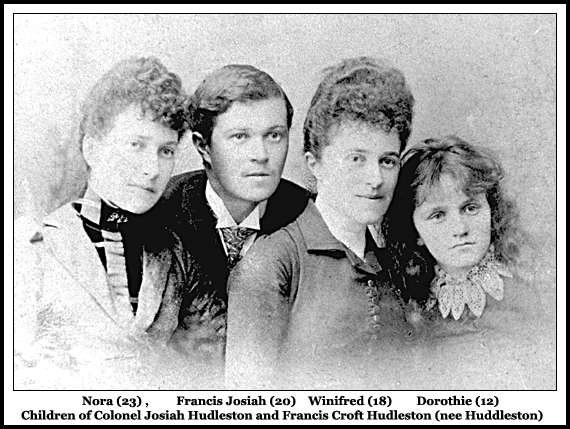'Francis (Frank) Josiah Hudleston'

'Francis (Frank) Josiah Hudleston'
|
|
C.B.E., Librarian at the War Office, Chevalier of the Legion of Honour. With thanks to the research efforts of Richard Searle and by courtesy of the MOD Library, reprinted below are notes prepared for the speaker (Lord Milner) at the unveiling of the commemorative plaque. Initially when I posted the notes in 2003 I thought that they were written by my mother (Joan Hyde - nee Hudleston), however today (11 January 2006), I received some documentation from Richard Searle that clearly showed their origin.
Richard wrote to me on the 19th April 2004 as follows:
In 1992 I was appointed Chief Librarian to the Ministry of Defence. On my wall, behind my desk in 3-5 Great Scotland Yard was the memorial plaque to your grandfather, my most illustrious and celebrated predecessor. MOD Library relocated to Great Scotland Yard from the Old War Office in 1988-9 and it was considered fitting and appropriate to remount the plaque in the Chief Librarian's office in Frank Hudleston's memory. When I retired in February, 2000, your grandfather was beyond living memory but I knew that among the Library archives was a small file, known by the Library staff as "the Hudleston Papers". It was not till I had moved to Dorset and had become a member of the Sylvia Townsend Warner Society that I recognised the connection. I then made it my duty to return to Great Scotland Yard to examine the file. At that time I thought I might compose a short note about Frank Hudleston, if enough documentary material existed to make it feasible, for publication in the STW Society Newsletter. Sadly, there was very little but I obtained photocopies of what there was ..."
I received a later email on 21st December 2005 which reads: When the dust had settled and everything rehoused I was all set to visit London, with the express purpose of consulting the Library archive (July), when there was a day of bombings in London which rather put me off going. With all that behind us now I have made 2 visits and was able to peruse three boxes of material dating from around the turn of the 20th century to about 1940. The papers relate mostly to library administration, acquisition and disposal of books, cataloguing, and so on. But there are documents, some in F.J.H's hand, which I imagine would be of interest to you: There is a small file relating to the arrangements for the memorial plaque, which include (a) War Office press communique on unveiling the plaque, issued 24 July, 1928; (b) report of the ceremony from The Times newspaper dated 25 July, 1928 (largely reprinting the press communique); typed notes on organisation of the subscription for the memorial ..."
The notes for the unveiling of the memorial plaque are as follows:
(1) "Warriors in Undress". A collection of Articles on the "human side" of departed military leaders including a remarkable essay on 'the famous Duke of York' and his 'fair friend' Mary Ann Clarke, respectively a favourite hero and heroine of the author. This book had a great success in America, many letters of appreciation being sent. It led to the author being invited by an American firm to write --- (2) "Gentleman Johnny Burgoyne". The biography of a very "human" hero of the American Independence: General Sir John Burgoyne. Besides these works there exist in manuscript - two works on cats and a lecture on the 'books and readings' delivered to a War Office audience in the R.U.S.I. All his writings are very erudite and at the same time inspired with a playful wit. He was very proud of his descent from an old 12th century family, which took its part in the great events of English history, the Crusades, the French Wars, the Scottish Wars, The War of the Roses and the Civil War, in which they fought on the losing side. This may account in part for his antipathy to Oliver Cromwell, a man he loved to traduce, and for his partiality for "corrupt peers", whom he regarded as the best rulers the country ever had. But in the main he loved "corrupt peers" and their "female friends'' because they were odd characters. Oddity he particularly appreciated. Says his brother-in-law, Mr Arthur Machen, "He took all queerness for his province". He enjoyed their gaiety and follies because he found them to be very human characters. A character himself, he was always delighted to be likened to Mr Pickwick, a comparison easily made. His unfailing courtliness and sympathy made him the confidant of large numbers of men and women of various types and who mutual enemies could confide in him without fear of his bungling their secrets. His friends were many in and out of the Office and several of the latter took the initiative in proposing this memorial. The Arms of Hutton John of which he was very proud have been incorporated with the consent of the head of the family, Mr Ferdinand Hudleston. Two stories in connection with him which you may like to refer to: 1. How he came to be Librarian. His predecessor was found to be making a small fortune by carrying on a trade in small arms with a foreign country. He was accordingly transferred to another Government Department; Hudleston was then appointed in his place. 2. In the South African War the Boers asked to be allowed to send a cypher telegram to the Netherlands. They were permitted to do so. A number of people then tried to decypher it. Eventually Hudleston did so and the information thus gained proved to be most valuable. |
|
|
|